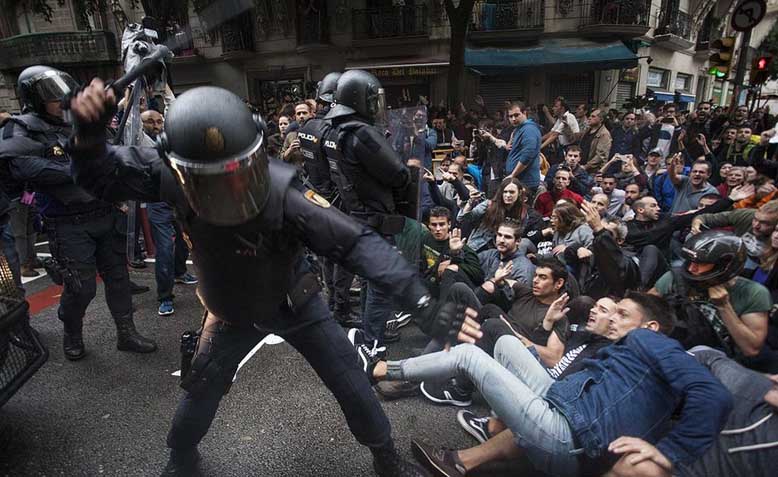 Police officers hitting protestors organised in passive resistance in Barcelona during the independence referendum of 2017. Photo: Wikipedia
Police officers hitting protestors organised in passive resistance in Barcelona during the independence referendum of 2017. Photo: Wikipedia
As the wave of repression from the Spanish state continues, Catalonia needs our solidarity now more than ever, argues Chris Bambery
What is happening today in Catalonia represents the biggest assault on democracy in any Western European state in many a long year.
The right-wing Spanish government of Mariano Rajoy has unleashed a wave of repression against a peaceful movement for Catalan democracy which is gathering pace and virulence.
Silence reigns within the European Union, as it has since 1 October when Rajoy sent in his paramilitary police to try and stop a referendum on independence agreed by the Catalan Parliament. They seized ballot boxes and ballot papers, smashed their way into polling stations and attacked those peacefully trying to cast their vote.
On Friday, a Spanish court charged 13 Catalan politicians with rebellion, which carries a 30-year jail sentence. The five who appeared in court were jailed pending trial. Another, Marta Rovira, general secretary of the Catalan Left Republican Party, has fled to Switzerland to avoid jail. Among those now in jail are Carme Forcadell, the former speaker of the Catalan Parliament, and Raul Romeva, the former Catalan Minister of Affairs, both of whom have visited London and addressed British MPs. Joining them is Jordi Turull who is the current candidate to be the President of Catalonia.
Their “crime” is to have voted for the declaration of Catalan independence following the vote in favour of that step in the October referendum.
Also, on Friday, the Spanish government issued a European arrest warrant against the Catalan President, Carles Puigdemont, currently visiting Finland, from his refuge in Brussels, and three other former ministers, one of whom, Clara Ponsati, has resumed her academic post at St Andrews University.
Meanwhile, two other former ministers have been in jail awaiting trial since the start of November. Oriol Junqueras and Joaquim Forn have been refused bail and their request to be moved to a Catalan prison. Also in jail are Jordi Cuixart and Jordi Sanchez, heads of the two biggest civil organisations in Catalonia.
Catalonia remains under the direct rule of the Rajoy government despite pro-independence parties winning the 21 December elections Madrid called.
The Rajoy government has been relentless and unmerciful in its treatment of pro-independence figures in Catalonia. The ruling Popular Party, while not a Francoist party, is made up of the grandchildren of those who served the fascist dictator who ruled Spain from 1939, when the Nationalists won the Spanish Civil War, until his death in 1975. But they share his insistence on the indivisibility of Spain, a refusal to recognise the Catalans and Basques as nations, and a hatred of their languages.
Ever since Catalonia gained its autonomy after the end of the dictatorship, there have been constant attempts to row that back. The worst instance was when, in 2010, the Spanish Constitutional Court struck down key clauses in a new Statute of Autonomy, agreed by both the Spanish and Catalan Parliaments and by a referendum in Catalonia. The case was brought by the Popular Party. The judges of that court are in the main appointed by Madrid politicians and there is widespread criticism by human rights bodies of the lack of independence in the Spanish judicial system. Added to that are serious legal restrictions on free speech.
The Rajoy government has helped unleash a wave of Spanish nationalism, directed against Catalonia, which cheered on the 1 October police attacks. It is also under pressure from the neoliberal Ciudanos party, which is demanding even tougher measures against the Catalan independence movement. Both parties have benefitted from those in the opinion polls.
In Catalonia, the failure of the Catalan government and its supporters to follow through on its declaration of independence, and, in contrast, the speedy and full-blooded reaction of Madrid created confusion and a degree of demoralisation. Now, however, the movement is growing once more on the streets. It is there that the response to Rajoy must be built.
Today, what is at stake in Catalonia, Spain, and the European Union is a fundamental attack on democratic rights and civil liberties. In Catalonia, I would urge supporters of independence to rally support exactly on that basis, so as to involve those who do not support independence but do support Catalonia’s right to self-determination.
That means campaigning to free the prisoners and to stop the trials, for the exiles to be allowed to return, and for the Catalan Parliament to resume its control of Catalonia.
This platform needs to address those in Spain who can grasp that what Rajoy and the courts are inflicting on their opponents in Catalonia will be doled out against their opponents nearer home.
Across the EU we must demand an end to its silence which means support for Rajoy. In Scotland, and across the UK we need to organise to defend Clara Ponsati, including demanding clear support for her from the Scottish Government. The Theresa May administration is a close ally of Rajoy and it needs to be put under pressure.
Catalonia needs solidarity, now.

